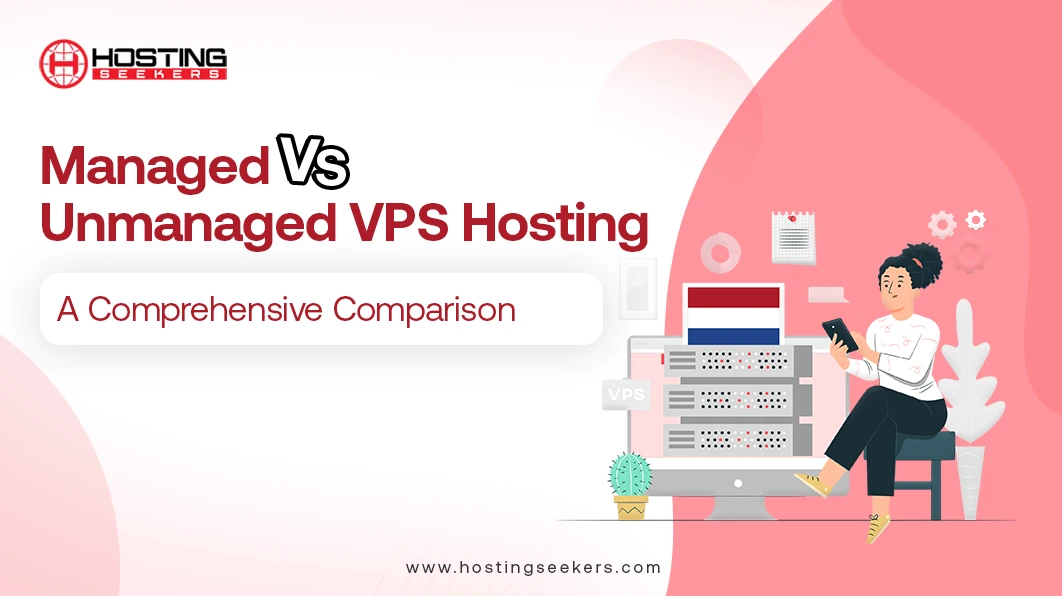
Managed vs Unmanaged VPS Hosting: A Comprehensive Comparison 2025
VPS Updated on : September 29, 2025Table of Content
- What is Managed VPS Hosting?
- Typical Services Included in Managed VPS Hosting
- Ideal Users of Managed VPS Hosting
- What is Unmanaged VPS Hosting?
- Users Responsibilities in Unmanaged VPS Hosting
- Ideal Users of Unmanaged VPS Hosting
- Comparison Table: Managed Vs Unmanaged VPS
- What are the Pros and Cons of Managed VPS?
- What are the Pros and Cons of Unmanaged VPS?
- Which One Should You Choose – Managed VPS vs Unmanaged VPS?
- What are the Top Use Cases for Each Type – Managed VPS vs Unmanaged VPS?
- Popular Managed & Unmanaged VPS Providers
- Conclusion
- Frequently Asked Questions (FAQs)
VPS (Virtual Private Server) Hosting is a type of web hosting that allocates dedicated resources by dividing a physical server into multiple virtual servers. It provides greater flexibility and scalability.
As businesses and individuals increasingly seek tailored hosting solutions, Virtual Private Servers (VPS) have emerged as a powerful solution that caters to their needs. The market value for VPS hosting is expected to reach 14.1 billion (USD) by 2033; it is expected to have a CAGR of 11.9% from 2025 through 2033.
As Managed VPS hosting allows the providers to manage tasks on server. In contrast, Unmanaged VPS hosting places the responsibility of server management on the user. These two types offer various features for their ideal users.
Considering their diversifications, users must make an informed decision while choosing the hosting option. In this blog, we will provide a detailed comparison between Managed and Unmanaged VPS hosting to allow users to maximize the benefits of their website or application.
What is Managed VPS Hosting?
Managed VPS (Virtual Private Server) hosting is a type of web hosting service that combines the benefits of a virtual private server with the added layer of management and support from the hosting provider.
In a VPS environment, a physical server is divided into multiple virtual servers, each isolated from the others, allowing users to have dedicated resources such as CPU, RAM, and Storage.
Managed VPS hosting means that the hosting provider takes care of the server management tasks, allowing users to focus on their websites or applications without needing extensive technical knowledge.
Key Features of Managed VPS Hosting
Dedicated Resource
Each VPS has its own allocated resource, ensuring consistent performance and reliability. Users do not share resources with other customers, which can lead to better speed and uptime.
Root Access
Users typically have root access to the VPS. It allows them to install and configure software as needed. Their level of comfort is essential for those who want to customize their server management.
Scalability
Managed VPS allows users to easily scale their resources (CPU, RAM, Storage, etc.) as their needs grow, without significant downtime or migration issues.
Performance Optimization
Hosting providers often implement performance optimization, such as caching solutions and content delivery networks (CDNs) to enhance the speed and efficiency of the hosted applications.
Security Measure
Managed VPS hosting includes various security features such as firewalls, DDoS protection, and regular security audits to protect against threats and vulnerabilities.
Technical Support
Users receive 24/7 technical support from the hosting provider, which can include assistance with troubleshooting general inquiries and server management.
Typical Services Included in Managed VPS Hosting
Updates and Patching
Regular updates to the operating system ensure security and performance. This includes automatic patching for vulnerabilities.
Security Managements
Implementation of security protocol including firewalls, intrusion detection, and malware scanning. Regular security audits and vulnerability assessments are common.
Backups
Automated backups for the server and data. It often provides options like daily, weekly, and monthly backups. This ensures that data can be restored in case of loss or corruption.
Monitoring
Continuous monitoring of server performance, uptime, and usage of resources. Alerts are typically sent to both the users and hosting providers in case of any issue.
Server Configuration
Initial setup and configuration of the server environment, including the installation of necessary software and application based on user requirements.
Performance Optimization
Regular assessments and adjustments to optimize server performance, including resource allocation and load balancing.
Technical Support
Access to a knowledgeable support team that can help in assisting any troubleshooting, server management or any other technical issues.
Ideal Users of Managed VPS Hosting
Non – Technical Users
Individuals or business owners who don’t have any technical expertise to manage a server but still want the benefits of a VPS server. Managed Server allows them to focus on their core business without worrying about server management.
Businesses
Small to medium businesses that require reliable hosting for their website, applications, and e-commerce platform. Managed VPS hosting provides the performance and security needed for business–critical operations.
Those Seeking Convenience
Users who prefer a hassle-free hosting experience and want to avoid the complexities of server management. Managing VPS Hosting allows them to delegate technical tasks to experts while they concentrate on their business goals.
Developers and Agencies
Web developers and digital agencies that need a flexible and scalable hosting solution for their projects. Managed VPS hosting allows them to deploy applications.
What is Unmanaged VPS Hosting?
Unmanaged VPS hosting is a type of web hosting service where users are provided with a virtual server that they can configure and manage according to their needs.
Unlike managed VPS hosting, where the hosting provider takes care of the server management, Unmanaged VPS hosting hands over the responsibility of server management, configurations, security, and troubleshooting (if any) to the users.
This type of hosting id typically the most effective and offers greater flexibility and control over the server environment.
Key Features of Unmanaged VPS Hosting
Root Access
Users have full root access to the server, allowing them to install or configure any application or software they require. This level of access is crucial for developers and system administrators who require complete control over their server environment.
Customizable Environment
Users can choose their operating systems (like Linux distribution, Windows server, etc.) and customize the server settings to meet specific requirements. This flexibility is ideal for applications that have their unique considerations and requirements.
Scalability
Unmanaged VPS hosting allows users to scale resources (CPU, RAM, Storage resources) as needed. This is particularly beneficial for growing businesses or applications that experience fluctuating traffic.
Cost Effectiveness
Generally, Unmanaged VPS plans are more effective than managed VPS options, making them an excellent choice for users who have the technical expertise to handle and manage the server themselves.
Performance
VPS hosting typically offers better performance than Shared hosting, as resources are specifically allocated to the virtual server. It reduces the impact of other users on the same physical servers.
Isolation
Each VPS operates in its isolated environment, meaning that issues on one VPS do not affect others on the same physical server. This isolation enhances security, scalability, and flexibility.
No Technical Support
While some providers may offer limited support, the primary responsibility for server management lies with the users. This means that users must be prepared to handle any issue that arises without relying on the hosting provider for any assistance.
Users’ Responsibilities in Unmanaged VPS Hosting:
Server Setup
Users are responsible for installing the operating system, configuring server settings, and setting up necessary software or applications. This may include web servers (like Apache, Nginx), databases (like MySQL, PostgreSQL), and other services.
Maintenance
Regular maintenance tasks include applying software updates, managing backups, and monitoring server performance. Users must ensure that the server is running optimally and that all software is up to date to prevent vulnerabilities.
Security
Users must implement security measures to protect applications from unauthorized access and threats or attacks. This includes configuring firewalls, setting up SSH keys, managing user permissions, and regularly auditing security settings.
Trouble Shooting
When issues arise, users are responsible to diagnose or resolve the issue. This may involve analysing server logs, debugging applications, and addressing networking issues. Users must have technical knowledge to resolve the trouble shooting effectively.
Ideal Users of Unmanaged VPS Hosting
Developers
Developers who need a customizable environment for testing and deploying applications will benefit from Unmanaged VPS hosting. They can configure the server to fulfil their deployment needs and allow them to install desired features or tools.
System Administrators
Sysadmins or system administrators who are experienced in managing servers will find Unmanaged VPS hosting to be a suitable option. They can leverage their skills to optimize server performance and security measures and ensure the server runs smoothly.
Users with Technical Expertise
Users with a strong understanding of server management, networking, and security can grow significantly in an Unmanaged VPS hosting environment. This includes IT professionals, tech-savvy entrepreneurs, and businesses that require a high level of control over their hosting environment.
Comparison Table: Managed Vs Unmanaged VPS
| Factors/Features | Managed VPS | Unmanaged VPS |
| Server Management | It is fully managed by the hosting provider. | In this model, the user is responsible for managing all the tasks. |
| Support | 24/7 customer support. | Limited or Negligible support. |
| Root Access | Typically, limited root access or no root access. | Full root access for full control over the server environment. |
| Pricing | $10 to $50 per month (price may vary depending on Hosting provider) | $2 to $30 per month (price may vary depending on Hosting provider) |
| Software Update | Automatic update and patching. | Users need to manually update software and patching. |
| Security | Enhanced security measures are provided. | Users must implement security measures and manage security. |
| Backup Solution | Regular (daily/weekly/monthly) backup is included. | Users need to set up and manage backup on their own. |
| Customization | Limited customization options. | Users can customize tools and software as per their needs. |
| Ideal Users | Suitable for non-technical users, business owners, etc. | Suitable for developers, technical experts, and sysadmins. |
| Performance | Performance monitoring tools are provided. | Users need to implement performance monitoring tools. |
| Scalability | Easy to scale. | Users need to scale independently. |
| Reliability | Highly reliable with managed services and support. | Reliability depends on user management and setup. |
| Flexibility | Less flexible due to managed services. | Highly flexible. |
What are the Pros and Cons of Managed VPS?
Pros
- The hosting provider handles server management tasks, allowing you to focus on your business.
- Access to technical support for trouble shooting and assistance.
- Includes advanced security features like regular backups and malware protection.
- Providers optimize server settings for improved website performance and faster load times.
- Easily accommodates traffic spikes and allows for growth without performance issues.
Cons
- Generally expensive than Unmanaged options due to its additional services.
- Limited ability to customize server settings, which may not be suitable for every user.
- Some plans may restrict certain applications and plugins, which limits flexibility.
- Relying on the provider for service and maintenance can be risky sometimes if the quality varies.
- Often tailored for specific websites, which may not be suitable for every website.
What are the Pros and Cons of Unmanaged VPS?
Pros
- Unmanaged plans are cheaper due to lack of provider–managed services.
- Users get root access and full customization.
- Users can install OS, software, or tools.
- Ideal for building sysadmins or DevOps skills.
- Dedicated resources ensure consistent performance.
- Resources (CPU, RAM, etc.) are not shared.
Cons
- Requires knowledge of server setup, security and maintenance.
- Users handle troubleshooting, updates, and patching.
- Providers only ensure server uptime, not software or OS issues.
- Vulnerable to attacks if misconfigured.
- Users need to set up their own backups.
- Scaling requires manual efforts (migration, or upgrading plans, etc.)
Which One Should You Choose – Managed VPS vs Unmanaged VPS?
Choose Managed VPS if:
You have limited technical expertise or no technical knowledge. If you want to consume time and focus on your business goals rather than server management.
It is ideal for users who seek 24/7 technical support, automatic updates, backup,s and security measures.
A managed VPS offers user-friendly tools and scalability,y making it an excellent choice for businesses looking for reliable and hassle-free hosting solutions.
Choose Unmanaged VPS if:
You possess technical expertise. And have the skills to manage the configuration process. If you want full control over your server environment.
This option is more cost effective as compared to Managed VPS. An Unmanaged VPS is perfect for individuals looking to gain experience in server management.
It is perfect for those who want to optimize their resources as per their requirements.
What are the Top Use Cases for Each Type – Managed VPS vs Unmanaged VPS?
Managed VPS
Bloggers
Managed VPS is an ideal choice for bloggers, who want to focus on content creation rather than on server management. This helps bloggers to ensure that their site is running smoothly without any troubleshooting.
Corporate Websites
Businesses often require reliable and secure hosting for managing their corporate websites. With Manages VPS, companies may ensure compliance with security and access to the technical support.
SaaS Applications
SaaS (Software as a Service) applications often require high availability, security, and reliability. A managed VPS can provide the infrastructure needed to ensure the growth of these applications.
Unmanaged VPS
Development Environments
Developers often use Unmanaged VPS for testing and deploying applications. They have complete control over their server environment. It allows developers to install any tool or software required for the development environments.
Gaming Servers
Unmanaged VPS hosting is popular for hosting gaming servers. These users want to customize the server settings and install desired gaming software.
Custom Apps
Businesses or developers who create custom applications will prefer an Unmanaged VPS. As it offers them full control over their server environment and configuration.
Popular Managed & Unmanaged VPS Providers
Managed VPS
Liquid Web
Liquid Web is known for its high-performance managed VPS hosting solutions. It offers various VPS services on reliability, customer support, and security.
Hosting.com
Hosting.com provides a variety of hosting solutions, including managed VPS. They emphasize speed and performance. Popular features they offer are managed services, turbo servers to enhance speed, free site migration, 24/7 support, and many other features.
InMotion Hosting
InMotion Hosting offers managed VPS while focusing on customer support and performance. Their popular features are managed VPS plans, free backups, SSD storage, and 24/7 customer support.
Unmanaged VPS
DigitalOcean
DigitalOcean is a cloud infrastructure that offers scalable virtual servers. It focuses on simplicity and developer friendliness.
Linode
It is a cloud hosting provider that offers powerful and flexible VPS solutions. They are popular for their performance and straightforward pricing.
Vultr
Vultr provides cloud computing services with a focus on simplicity. They offer a wide range of VPS solutions with enhanced performance.
Conclusion
Both Managed and Unmanaged VPS hosting offer diverse features to the users. Managed VPS is suitable for users who prefer saving time to focus on business goals rather than server management and for users who lack technical expertise.
Unmanaged VPS hosting is a suitable choice for those who prefer complete control over their server environment and have technical expertise to handle tasks like configuration, resource optimization and upgradation of plan.
Users can choose between Managed and Unmanaged VPS as per their business goals, requirements (for scalability, flexibility, reliability, etc.), technical expertise and many other factors.
Frequently Asked Questions (FAQs)
Q 1: What is VPS hosting?
Ans: VPS (Virtual Private Server) Hosting is a type of web hosting that allocates dedicated resources by dividing a physical server into multiple virtual servers, offering more flexibility and scalability than shared hosting.
Q 2: What is Managed VPS hosting?
Ans: Managed VPS (Virtual Private Server) hosting is a type of web hosting service that combines the benefits of a virtual private server with the added layer of management and support from the hosting provider.
Q 3: What is Unmanaged VPS hosting?
Ans: Unmanaged VPS hosting is a type of web hosting service where users are provided with a virtual server that they can configure and manage according to their needs.
Q 4: Which is cheaper – Managed VPS vs Unmanaged VPS?
Ans: An Unmanaged VPS is less costly compared to a Managed VPS. As Unmanaged VPS Hosting lacks provider – managed services. This makes it ideal for users with technical expertise.
Q 5: Does Unmanaged VPS hosting provide customization?
Ans: Unmanaged VPS hosting provides the privilege of customizing tools and software as per the requirement of users.




